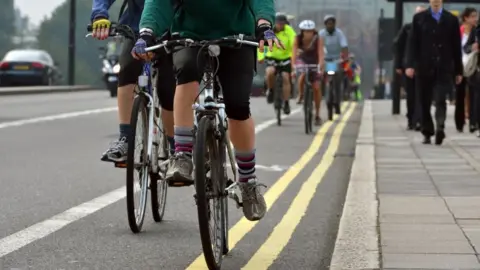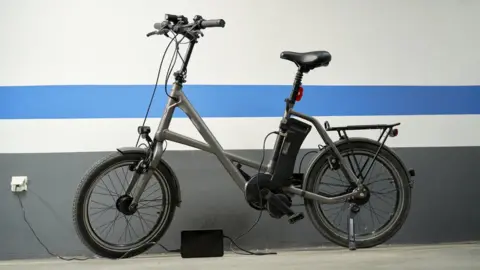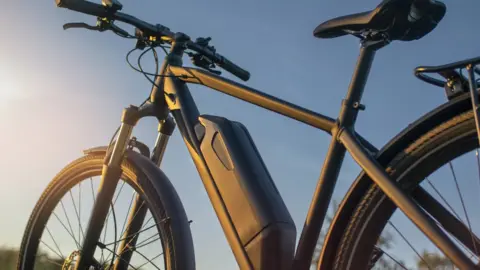E-bikes: What is the law and is there an age limit?
 BBC
BBCElectric-powered bikes have been involved in two recent incidents in which young people have died.
Last month, two boys were killed in Ely, Wales, when they crashed shortly after being followed by a police van, and a 15-year-old died in a crash in Salford on Thursday.
Electric bikes - or 'e-bikes' - are an increasingly popular way to get around for hundreds of thousands of people in the UK.
But what constitutes a road-legal e-bike isn't straightforward, and models with differing power and speed capabilities are treated completely differently in law.
A councillor in Salford, where 15-year-old Saul Cookson died on Thursday, warned of "unregulated" e-bikes, which he said could reach speeds of 60mph.
Here is everything you need to know before buying or riding an e-bike.
What is an e-bike?
The broad term 'e-bike' is commonly used for any electric-powered bike, but it can actually refer to very different types of equipment which are covered by different laws.
When most people think of an e-bike, they picture what is essentially a normal push bicycle with a small chargeable motor fitted to make it easier for the user to turn the pedals.
This is what the government considers to be an e-bike too and, as long as the model meets certain requirements on maximum top speed and motor size, they are treated as regular bikes under the law in almost all respects.
But not all of the products available on the growing e-bike market meet these standards, and anyone looking to buy one needs to know the difference.
Which e-bikes are legal in the UK?
If you're looking for an e-bike which is treated as a regular bike as far as the rules are concerned, then it must meet the government's 'electrically assisted pedal cycle' (EAPC) requirements.
This means the power output of its motor is capped at 250 watts, and the motor isn't capable of propelling the bike any faster than 15.5mph (25kph).
If the model ticks these boxes, then it can be ridden anywhere a normal pedal bike is allowed.
But there are also far more powerful electric-powered bikes on the market which are sometimes lumped in with e-bikes - for example, some models can hit 60mph and are designed for off-road riding in rugged terrain.
These bikes are not necessarily illegal but because they aren't EAPC compliant, they are classed as motorcycles by the law and covered by a completely different set of rules.
Is there an age limit for using an e-bike?
Yes - the main difference between e-bikes and regular bikes is that all e-bikes have a minimum age requirement for them to be ridden legally.
To use an EAPC legally in the UK, you must be at least 14 years old.
And for more powerful models, the rider needs to be 16, the age at which they can get a licence to ride a motorcycle.
 Getty Images
Getty ImagesDo you need a licence to use an e-bike?
Riders don't need a licence for an e-bike which meets the government's EAPC standards - and they don't need to be taxed, registered or insured either.
But faster bikes with larger motors are treated the same as mopeds or motorcycles.
This means riders must have a valid driving licence and get their bike insured, registered and taxed like any other vehicle.
Do you have to wear a helmet while using an e-bike?
While the Highway Code and road safety groups encourage cyclists of any kind to use a helmet, this isn't actually a legal requirement under UK law.
But it is illegal to ride a motorcycle without a helmet - and because non-EAPC bikes are classed as motorcycles, riders must wear a helmet while riding one.
Are e-bikes safe?
E-bikes are increasingly popular, and campaigners say those which meet EAPC standards are just as safe as regular bikes, as their motors only assist until the rider reaches the speed of an average cyclist.
Although growth in the e-bike industry has cooled after a boom during the Covid-19 pandemic, UK sales have grown by more than two thirds since 2019, with 155,000 sold last year.
Peter Eland, technical and policy director at the Bicycle Association - which represents the British cycling industry - said e-bikes could play a major role in helping to cut carbon emissions.
 Getty Images
Getty ImagesBut he said industry leaders were concerned about models being imported into the UK market which were not EAPC compliant.
He told the BBC there was a "huge problem" with models being wrongly described as road-legal e-bikes, and that he had seen non-EAPC vehicles mislabelled by non-reputable sellers.
"We see some models marketed as e-bikes and immediately report them to the authorities - we've referred three suppliers to the regulator in the last month," he said.
Duncan Dollimore from Cycling UK, a charity which campaigns on cycling issues, said e-bikes were hugely beneficial for many users, especially people with health and mobility issues looking for a less intensive way to cycle.
But he warned that e-bikes were sometimes being confused with other more powerful electric-powered bikes, and encouraged anyone looking to buy an e-bike for themselves or their teenage child to read up on the rules and specifications first.
Mr Eland urged people who wanted to make sure their e-bikes were EAPC compliant to buy from a UK supplier, or one which worked with the UK's regulators to ensure safety standards.
He said he "wouldn't be surprised" if some parents had unwittingly bought their children what are effectively motorcycles after mistaking them for e-bikes.
